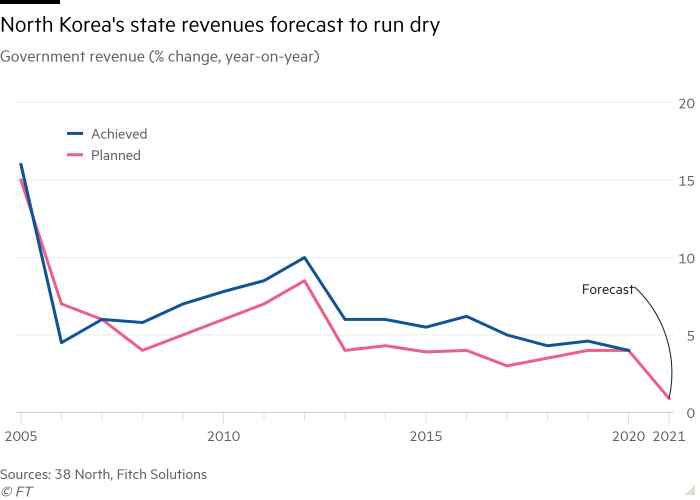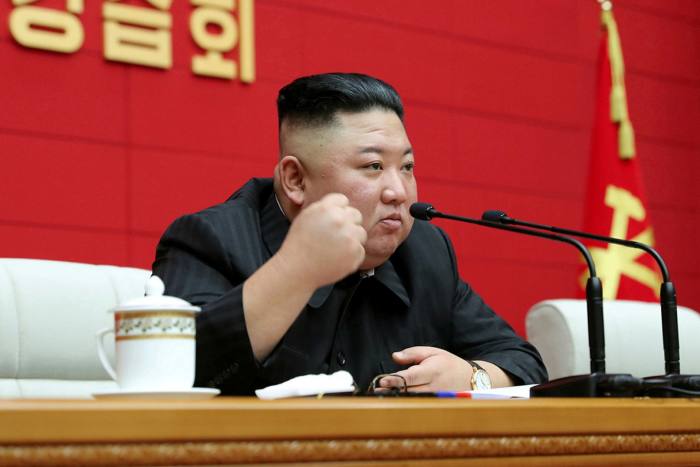On the western bank of the Yalu in the Chinese city of Dandong, containers packed with medical supplies and protein biscuits stand untouched, prohibited from being trucked across the river and into North Korea.
On the opposite bank at Sinuiju, construction of a new bridge, roads and buildings has slowed to a crawl — Kim Jong Un’s master plan for modernising the border gathering dust.
The bleak scenes reflect a nation still cut off from the outside world more than a year after Kim Jong Un severed almost all of North Korea’s land, sea and air links in response to the explosion of coronavirus cases in China.
Aidan Foster-Carter, a North Korea expert at Leeds University, warned of a “great leap backwards” if Kim both rejected outside help and refused meaningful economic reform.
“Thanks to China and Vietnam, we know what a state socialist regime must do in order to re-dynamise its economy: in effect creating state capitalism while retaining communist party rule,” Foster-Carter said.
Foreign government officials, international aid workers, human rights activists and diplomats are urging the North Korean leader to partially reopen his country to foreign assistance. There are mounting fears over food security and economic collapse, while there is no clear plan to vaccinate a population of 25m people.

Lee In-young, South Korea’s unification minister, has called for greater international action and a softer stance on sanctions because of a potential humanitarian crisis.
“It is very important for us to provide this assistance at the right time,” Lee told the Financial Times.
Following a triple hit from the strict border closures, economic sanctions and devastating flooding last year, the economy is suffering its worst decline since famine killed millions of people in the mid-1990s, according to experts who follow the country closely.
Statistics surrounding North Korea are notoriously unreliable. However, data based on information supplied by sources inside the country, as well as anecdotal evidence from defectors, suggests steep price increases for basics such as food and clothing.
“We are in a very, very dangerous period,” said Lina Yoon, a researcher at Human Rights Watch.
“We’re in this moment where most of the harvest from the autumn has already been consumed. And we still have two or three months that we need to wait until the next [crops] come out.”
Peter Ward, a Seoul-based expert with the University of Vienna who tracks the North Korean economy, said corn, a staple for many people, had been trading “at near-record prices”.
“Most North Korean households are going to be hurting,” Ward said.
The freezing of cross-border trade, coupled with restrictions on domestic movement and sporadic citywide lockdowns, appears to be battering ordinary people who rely on buying and selling goods at the jangmadang, or local markets.
But it is also hurting the donju, North Korea’s moneyed class, which has profited immensely from trade with China and is a crucial source of revenue for the Kim regime.
Kang Chol-hwan, a North Korean defector who said he regularly spoke to people inside the country, described the market trading system as “almost paralysed”.
“People have started losing their means of livelihood,” Kang said.
In response to those challenges, Kim has increasingly espoused juche, the ideology of self-reliance developed by his grandfather and North Korean founding leader Kim Il Sung.
Rather than accept outside help or allow greater economic liberalisation, he has instead taken steps to centralise control while accelerating nuclear weapons development, many experts said.

Glyn Ford, a former member of the European Parliament with close connections to high-ranking North Korean officials, contests that Kim is encouraging some “market thinking” at the level of state-owned enterprises through a form of local management by the ruling Workers’ party.
At another border crossing 1,400km to the north-east of Sinuiju, a group of Russian diplomats and their families was forced last month to push an open-air rail cart across the Tumen river, their possessions stacked atop in boxes and suitcases, as they completed the final stretch of an intrepid journey towards Vladivostok and out of North Korea.
North Korea has applied to participate in the Covax vaccine alliance working to ensure equitable distribution of coronavirus jabs.
And Pyongyang is developing a “national deployment vaccination plan” while working with agencies including the World Health Organization and Unicef, a UN spokesperson told the Financial Times.
But Pyongyang fears that opening the border to allow the importation of jabs risks increasing transmission of the virus. And, following an exodus last year, there are few foreign diplomats or aid workers left inside the country to support or monitor a vaccination programme.
General Robert Abrams, who leads the combined US-South Korea forces, told congress this week that while Pyongyang’s virus response included shoot-to-kill orders along the North Korea-China border, the measures have also been used by “the regime leader to gain back more control of the economy”.
Abrams warned that food security would be at even greater risk if fertiliser imports from China were blocked at the border in April.
Seo Jae-pyeong, another escapee who now leads the Association of the North Korean Defectors, described Kim’s economic policies as “like wringing a dried towel”.
“I don’t expect North Koreans to go through pain worse than the time of the ‘Arduous March’, but I do expect them to suffer an equivalent pain,” Seo said, referring to the euphemistic name given to the famine period by state propagandists.
Additional reporting by Henry Foy in Moscow


